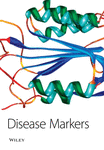Human Neutrophil Peptides 1-3 – Early Markers in Development of Colorectal Adenomas and Carcinomas
Abstract
Expression of Human Neutrophil Peptides (HNP) 1–3 was recently found to be associated with development of colorectal cancer. Raised defensin-expression in tumours is believed to stem from increased infiltration of neutrophils into tumour environment.
To further specify the role of α-defensins in tumourigenesis and progression, HNP1–3 were analyzed in colorectal adenomas and carcinomas of 87 patients and quantified in relation to cancer stage and grading. Using the ProteinChip arrays, HNP1–3 were found upregulated in both colorectal adenomas and carcinomas. By combining the array with Laser capture microscopy we were able to confirm that HNP1–3 are expressed by tumour cells but not by neutrophils or other tumour invading cells. These findings suggest that α-defensins are more likely to contribute to tumour growth than they are to mount an effective host anti-tumour response. However, the amount of HNP-expression was not found to be related to tumour stage, grading, and serological tumour markers.




